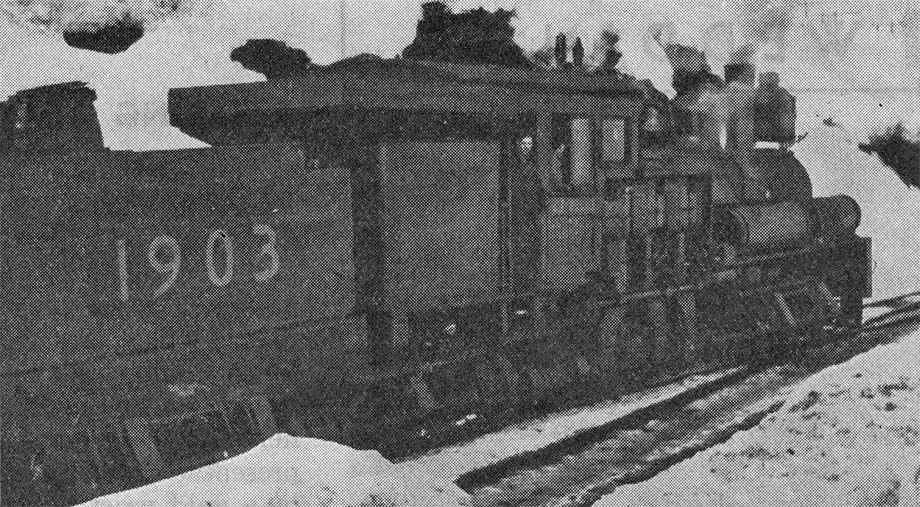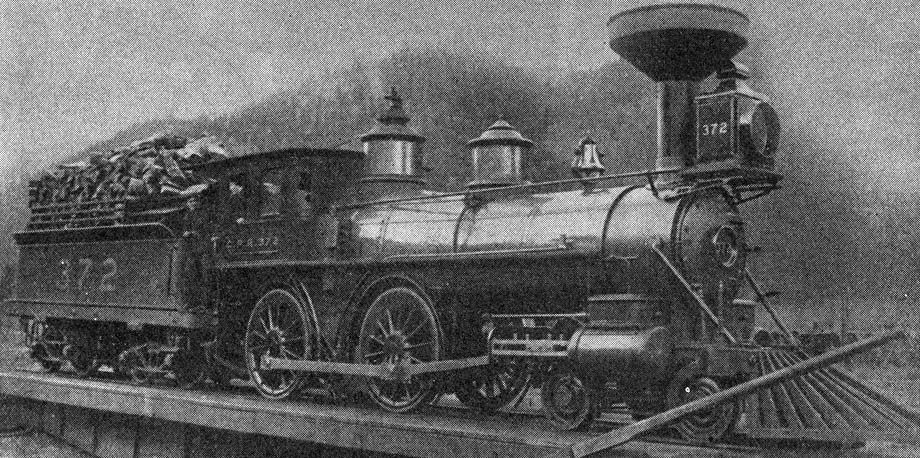
Canadian Pacific Staff Bulletin - April, 1946
Company Vet Recalls

There's at least one old-timer who could make an engine do things that would put a pack horse out of business.

He is T.L. Bloomer, a retired Rocky Mountain engineer, who has had experiences going back to the time when trains negotiated hills the hard way by going over them, not through. He remembers, for instance, the days when the "Sweeney", sometimes inaccurately called a water brake, was in use on the Big Hill at Field, B.C. This was a device for injecting saturated steam into the cylinders to prevent them from overheating when coming down in reverse, as was often necessary.
In those days new men behind the controls were not allowed to come down the Hill alone, but for the first few trips were coupled in behind another engine with a seasoned man at the throttle. To the men who learned their firing in the hills the sloping track was as familiar as their front steps and they "soloed" in shorter time than the men reared on the gentler grades of the Pacific sides.
After some elementary training on Sandon Hill and the Big Hill, Mr. Bloomer was switched to hauling ore on the Rossland Hill, the gradient so steep that ore trains had to stop periodically to prevent their wheels from overheating, and then cracking, from so much brake application. Traffic there has ceased now, except for the occasional freight to Rossland and the runs between Warfield and Tadanac.
An engineer in country like that is, by birth or development, a man of many parts. He is simultaneously a philosopher, mechanic, humorist, lover, and foe of nature, athlete, poet and pioneer.
If proof is required that his interests extend beyond the cab of his engine here are the words of Mr. Bloomer:
"I have seen sights that I certainly would not have seen if I had not been on an engine. A sailor, of course, has the same chance, but the man on the street misses much. Lunar rainbows, displays of aurora borealis, shooting stars, and lightning are well seen from a cab."
"One of the greatest displays of Aurora I ever saw was one midnight at Rossland in 1919. All the way up the hill there was a constant display and it attained its full glory by the time we reached the top. The whole heavens were vivid with color and at the zenith there was a huge opalescent centre. One writer described it as a diamond but to me it was an opal."
"From that, there descended a veil or tent-like wall of color which draped itself over the top of Red Mountain. This veil, or wall, seemed to be made of shot silk as it changed color and shimmered up and down. Then at the east and west sides, low down on the horizon, was a bright red light as from a forest fire. Not one foot of the sky was clear of color, a sight never to be forgotten."
Here is the mechanical, or "isn't-the-weather-lousy", side:
"One of the most trying difficulties on the Rossland Hill in the old days was bad rails caused by smoke from the smelter combining with dew or mist from the heavens. All sorts of schemes have been tried for overcoming this combination, steam jets to blow it off, and different methods of sanding. I have seen it so bad that the train crew had to get shovels and throw dirt from the side of the track onto the rails, and still the engine would slip."
"One man got the idea that if we allowed the steam to get low there would not be so much slipping. There was not, but there was considerable stalling. He was working on the theory that slipping was caused by too much steam being used."
"I have noted that a fall of light dry snow often made a good rail as it seemed to pick up the dirt and still left enough moisture to make the train pull easier. A very wet rail would at times make a good one. Light frost, dew, mist, or a light sprinkle of rain generally means trouble, and so do army worms. They were so bad at one time that it was a constant struggle to get up the hill, and another one to get down without the wheels sliding, as the worms would cluster on the rails for warmth when the sun went down. And how they would smell!""
Here is the humorous side:
"Talking about smells, when the late Jim O'Neill, father of "Tip" O'Neill of Kamloops, was
alive and running, he ran over a skunk. At that time the Thompson River was having a heavy flow of salmon and a
number of them had been left on the banks owing to a sudden drop of the water, creating an awful smell. So when
Jim struck the skunk he stuck his head out of the cab window, and turning to his fireman said, "By gad,
what a relief!"

 and is reprinted here with their permission. All photographs,
logos, and trademarks are the property of the Canadian Pacific Railway Company.
and is reprinted here with their permission. All photographs,
logos, and trademarks are the property of the Canadian Pacific Railway Company.